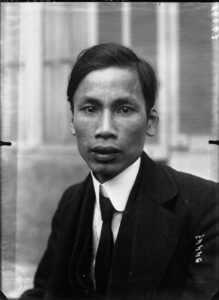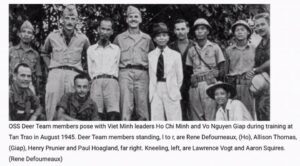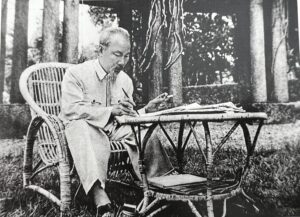A poet must learn to wage war.
∼Ho Chi Minh
Ho Chi Minh (May 19, 1890 – Sept 2, 1969) was a Vietnamese national, and the enigmatic, well-traveled leader of various political organizations in the early twentieth century, and the leader of communist Vietnam from 1945 until his death in 1969. As his life in activism and politics moved along, Ho’s identity moved along with it.

Ho as a young man
Nguyen Sinh Cung
( Ho’s Birthname )
Nothing is more precious than Independence and Liberty.
∼Ho Chi Minh
Nguyen Sinh Cung was born in 1890 near the city of Hue. Cung chafed at French colonial rule from an early age and was expelled from the National Academy of Hue for protesting the French and the Vietnamese appointed government who supported them. After his departure from university, he worked as a cook on a French steamer, traveling to various parts of the world, and eventually settling in Britain.
Nguyen Ai Quoc
( Ho’s 1st Adopted Name )
It was patriotism, not communism that inspired me.
∼Ho Chi Minh
In 1917 Cung moved to France and became politically active in the Vietnamese community there. He changed his name to Nguyen Ai Quoc. (Nguyen the Patriot)
In 1919, now under the name of Quoc and representing Vietnamese interests, he addressed a delegation of the Treaty of Versailles, unsuccessfully demanding that France give equal benefits to Vietnamese in their own country.
Bitter over the lack of support from the international community, Quoc joined the French communist party. After wearing out his welcome in France, he traveled to Russia where he kicked around a few years, immersing himself in communist doctrine.
Ly Thuy
( Ho in Disguise )
Colonial atrocities have prepared the soil; it is for socialists to sow the seeds of revolution.
∼Ho Chi Minh
After his political appetites were well wetted by the Russian communists, Quoc went to China where he connected with the Vietnamese community who were living in exile in Canton. To keep a low profile, he changed his name again, this time to Ly Thuy.
Having no tolerance for communist rabble, Chiang Kai-shek threw Thuy and most of his associates out. Now, quite the traveled firebrand, Thuy made his way back to Russia, then to Europe again before settling in Thailand for two years, stirring up the pot as always.

Ho Chi Minh
( The Enlightener )
Our mountains will always be, our rivers will always be, our people will always be, The American invaders defeated, we will rebuild our land ten times more beautiful.
∼Ho Chi Minh
In 1938 Thuy went back to China, this time hooking up with Mao Zedong. After France fell in WWII, Thuy hoped to use the defeat of the French to his native country’s advantage and he returned to Vietnam. It was during this time that he adopted the name of which he would always be remembered; “Ho Chi Minh”.
Ever the pragmatic one, Ho then partnered with the French to expel the Japanese from his land. After the Japanese were driven out, Vietnam and France failed to come to an amicable agreement regarding Vietnamese independence. War soon broke out between the two, and after several years of bitter fighting, the French were soundly defeated at Dien Bien Phu in 1954.
Subsequent Geneva accords divided the small nation at the 17th parallel. The agreement was supposed to be further settled by free elections in Vietnam which would eventually unify the country, however the United States and South Vietnam opposed the election. Soon hostilities broke out between the opposing parties, with China and the Soviet Union backing Ho and his followers, and the U.S backing South Vietnam. As the war raged on, Ho tightened his grip on the Vietnamese people in the north, as well as the Vietcong in the south. He used his popularity to drive those same people to sacrifice their lives, families and property for the cause.

Uncle Ho
( He Who Inspires )
You know, I am an old man, a very old man. An old man likes to have a little air of mystery about himself. I like to hold on to my little mysteries. ∼Ho Chi Minh, 1962
By 1963. Ho had turned most of his “official” power over to Le Duan, and Giap. Ho could now theoretically wash his hands of the duplicity needed to control the government, military and citizens of his war-torn land.
As a cult figure, he could concentrate his efforts on further inspiring the Vietnamese to continue their struggle, which had already inflicted terrible suffering on the small nation.
And though mostly a symbolic figure, Ho kept his toe in the fight, providing consul to Giap, Le Duan and others as needed. He also remained active on the international stage, exchanging barbs with any who disagreed with his methods and messages, and providing consul to those who hoped to echo his achievements.
In addition to fighting off colonialism and unifying the country, Ho was also a champion of literacy, and he greatly increased the literacy rate of Vietnam during his reign.
Ho died three months prior to my arrival in Vietnam. And although many of the South Vietnamese were on the opposing side of Ho, and fought against his followers; the respect and admiration for him was evident in the various posters, banners and tributes I noted during my time there. You didn’t have to love him, but his efforts on behalf of his people cannot be denied.
Ho’s legacy is evident in today’s Vietnam, where the country is unified, governed by Vietnamese, and productive. And although it will always be Saigon to some, Ho Chi Minh City is a lasting tribute to Ho…. the poet warrior.
***
You are welcome to share this blog in its entirety, citing Joe as the author. Copyright protected, all rights reserved © Joe Campolo Jr
Updated: April 28, 2024 at 12:55 pm
About the Author
Joe Campolo Jr.
Joe Campolo, Jr. is an award winning author, poet and public speaker. A Vietnam War Veteran, Joe writes and speaks about the war and many other topics. See the "Author Page" of this website for more information on Joe.
Guest writers on Joe's blogs will have a short bio with each article. Select blogs by category and enjoy the many other articles available here.
Joe's popular books are available thru Amazon, this website, and many other on-line book stores.


